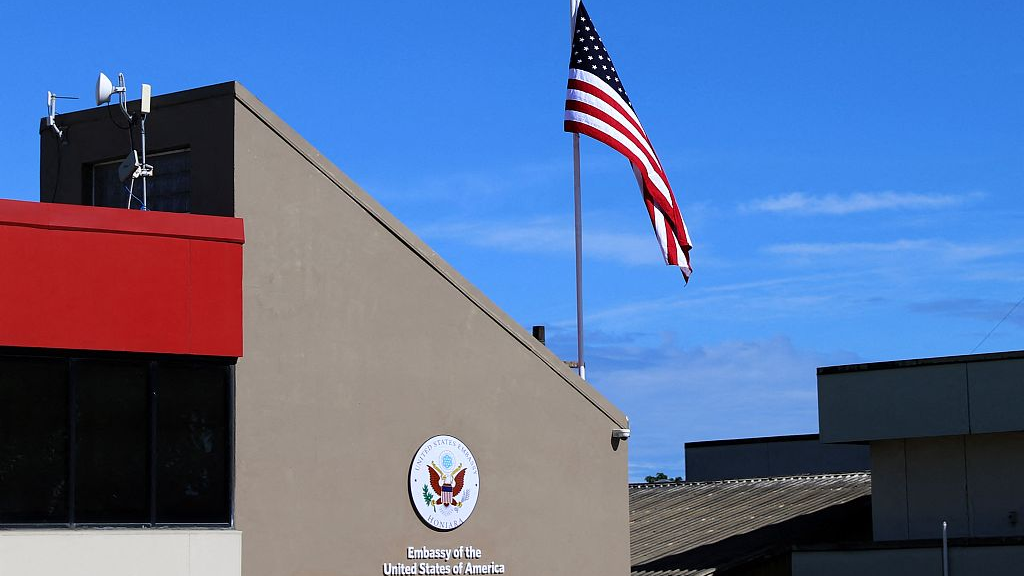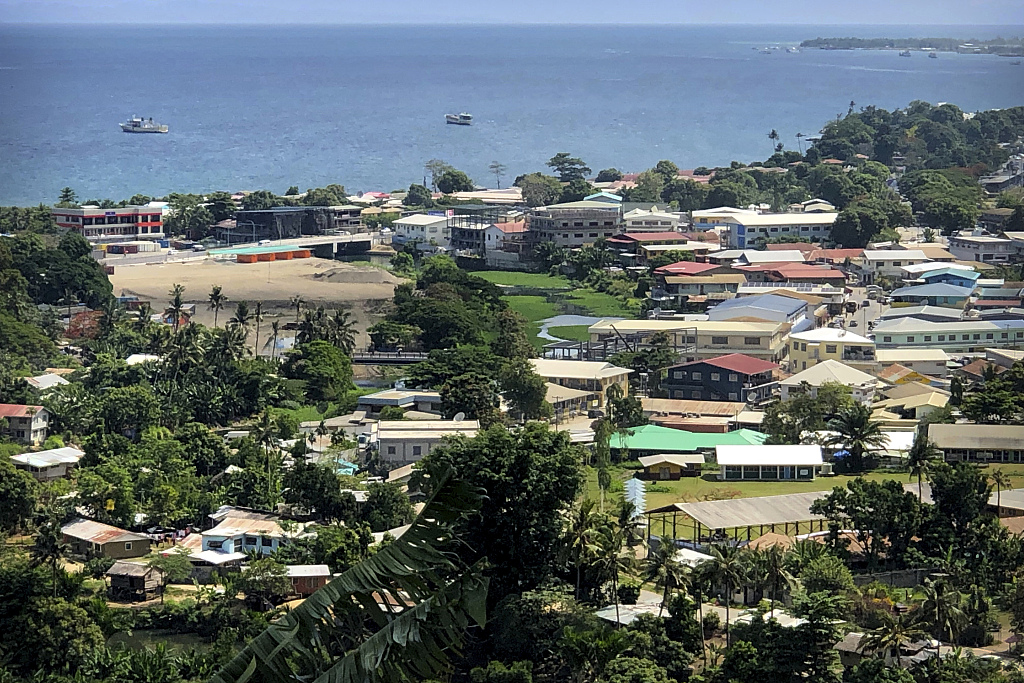
U.S. national flag hangs above the U.S. embassy building in Honiara, Solomon Islands, February 2, 2023. /VCG
U.S. national flag hangs above the U.S. embassy building in Honiara, Solomon Islands, February 2, 2023. /VCG
Editor's note: Hafijur Rahman is a columnist and Security and Strategic analyst, working in a prominent Strategic Studies Center in Bangladesh. The article reflects the author's opinions and not necessarily the views of CGTN.
The United States has re-opened an embassy in the Solomon Islands after a 30-year absence. The last U.S. embassy in the Solomons closed in 1993 amid post-cold war budget cuts. The diplomatic overture came in line with its years-long re-engagement efforts as it seeks to boost diplomatic relations in the Pacific region as a counter to China.
Though ostensibly asserted on the benign rhetoric to help the islanders redress their mounting problems – from ever-encroaching climate disaster to economic distress – the U.S.'s desperate diplomatic re-orientation drive at a time when the region is turning into a hotbed of geopolitical hostility is widely perceived as a part of its wider geostrategic agenda to woo the Pacific countries into serving as geopolitical pawns against China.
But given the broadly-shared revulsion to geopolitics and renewed regional vision across the pacific region, it raises a reasonable question: Can U.S. renewed diplomatic overtures reinstate its relevance in the region? Decades of western negligence and contempt combined with the innate U.S. foreign policy drawbacks have rendered the U.S. by a large margin irrelevant to the Pacific Island states and littoral nations.
Lack of endurance
Strategic interests have been the key driver of U.S. engagement. Typically, such a sort of engagement starts with many monumental commitments to its counterparts without pitching any required administrative details on how to get those materialized. With half-hearted efforts and episodic attention all along the way, the United States withdraws as soon as it realized existing commitments are no longer worth keeping.
The Pacific Islanders, which were used as militarized "containment bulwarks" during the Cold War and later abandoned into a decades-long diplomatic afterthought, are now mature enough to discern such dubious western intents and their "temporary pivot" to entrap the region into a self-interest driven geopolitical gambit. They have witnessed how Washington failed to follow up on its promises.

Ships are docked offshore in Honiara, Solomon Islands, November 24, 2018. /VCG
Ships are docked offshore in Honiara, Solomon Islands, November 24, 2018. /VCG
Priority problem
"Putting the cart before the horse" – America has long had a "priority problem" in its engagement with the Pacific nations. During its heydays of diplomatic engagement, the U.S. placed greater priority on issues such as vague security, ineffectual financial handouts, or empty liberal ideological buzzwords – including human rights, democracy, etc. – other than on those that could have made them structurally strong, economically sustainable, and resilient to the ever-engrossing climate change.
In a statement, while officially announcing the opening of the new embassy, U.S. Secretary of State Antony Blinken said the U.S. stands committed to working for the Indo-Pacific region to be "free and open" and an "environment where democracy can flourish." His remarks imply the U.S. overemphasizes geopolitical and value-centric priorities rather than the ones the Pacific countries are concerned about.
Similarly, the Biden administration put a host of Pacific priorities into the deal sealed with the Pacific countries last year. It is needless to say that the core concern, albeit implicit for the time being, was geopolitics posing the risk of overshadowing and even undermining the Pacific priorities.
But Pacific nations largely don't share U.S. values and rarely feel any sort of inclination to the American system, and secondly, current diplomatic emphasis is a "temporary pivot" passively prompted by China's growing influence in the region instead of one induced by active and generous intents to establish enduring relations to the Pacific's long-term benefits.
Commitments problem
Last year, the U.S.-Pacific Island Country summit concluded with numerous commitments to the Pacific nations. Yet, given Washington's longstanding "over-commitment but under-delivery" tendency, toxic political division at home, lack of administrative details to the policy promises, and so forth, it is highly suspicious whether Washington could drive those commitments into any transformative values.
The United States announced at the Pacific summit that it would invest more than $810 million in expanded U.S. programs in collaboration with private U.S. companies. Unfortunately, the initiative was thin on how Washington would get private companies to invest in the Pacific given their long-standing aversion to investing in the region.
As noted by Graeme Smith, a Pacific Islands expert at the Australian National University, in the New York Times, "You can turn the military tap on and, with congressional approval, the aid tap, but unlike China, they can't push their companies to engage with the region." Besides, a bogged-down bureaucratic tortoise and red-tap tangle embedded within the very administrative structure of the U.S. would make the commitments coming to reality much harder.
Opening up an embassy is largely a symbolic gesture of what was termed, "America is back." But here time and circumstances can carry much significance concerning the diplomatic re-orientation, especially when bilateral relation between China and the U.S. have spiraled into wider escalation and the countries within the region are at risk of getting dragged into this disastrous path. While the overall American foreign policy tendency has taken more "Kinetic form," such a non-kinetic approach should be taken with the utmost caution.
(If you want to contribute and have specific expertise, please contact us at opinions@cgtn.com. Follow @thouse_opinions on Twitter to discover the latest commentaries on CGTN Opinion Section.)